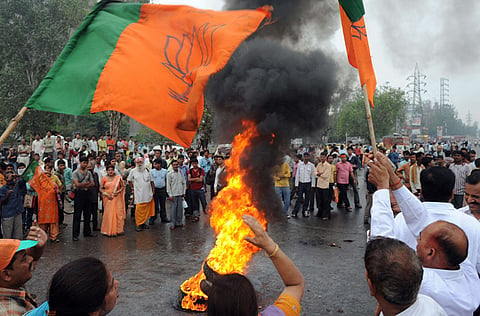Common man left out
Violent demonstrations in Andhra Pradesh and strikes reveal how India's politicians are overlooking the country's real issues

Yes, rage rules today. Not calm reasoning, nor reasoned protests. Not compassion, nor love of man or country. The current situation in my home state of Andhra Pradesh, India, where opinion is violently divided as to the carving out of a separate state from the original whole, convinces me of this.
The Srikrishna panel set up to look into the need or otherwise for this bifurcation of the state has advocated the continuation of a united Andhra Pradesh, but the separatists insist on the formation of a separate Telangana state no matter what, citing real and imagined instances of neglect and bias. To this end, roads are blocked, schools and colleges shut down, shops and malls vandalised, and both public and private property like buses and cars burnt to make their point. Who could ever believe that these goons are university students, not hired henchmen of warring political parties! Tomorrow these very rioters along with other long-suffering citizens will have to see their children repeat the school year, take longer to reach their office or home for lack of adequate transport facilities, and pay more for their daily necessities.
The all-India strike a few months ago and the havoc and loss created in its wake is another case in point. There are people enough who will stoke the fires of resentment and anger, whip the mobs to a frenzy not for the greater good but for their own. They mouth virtuous platitudes about raising awareness for the sake of the common man, who they say will continue to suffer until the government in power is brought down to its knees.
Just who is the common man they are talking about? During one panel discussion when the TV presenter spoke about the common man having to bear the brunt of the inconvenience and hardships the politician justified the crippling effects of the bandh (shutdown strike) by saying patronisingly, "The common man is not just the Prime Minister or Mrs. Sonia Gandhi. He is not just you or me. He is the man on the footpath, the daily labourer, the poor farmer who cannot afford his dal [lentils] and rice at today's prices."
Poor man's predicament
So, this man on the footpath, having left in desperation his village and family to seek better prospects in the city, who now looks to the small and cheap streetside eatery for his daily meal, where is he to go when that little shed is forced to close? What will that same man do when he sees his basket of vegetables that he is trying to sell kicked by the mobs and the vegetables rolling away to be crushed under the feet of the rioters?
Spiralling costs of vegetables, staples, petrol and kerosene have indeed made life difficult for all. But, are we Indians the only ones in this sorry situation? The most prosperous nations are also having to tighten their belts, while governments are finding it increasingly difficult to meet budget deficits. Closer home, our neighbours find themselves in an even worse predicament. I recently came across some data which makes me thankful that I am not in any of these countries where kerosene costs three times more than it does in India, and where the price of cooking gas ranges from between Indian Rs530 (Dh44) to Rs822 compared to the revised Rs385 here.
I do not believe that economically well-off citizens are in a better situation. They may have the means to be able to travel by air when trains are cancelled, but why should they shell out their hard-earned money for the suddenly steeply hiked ticket prices?
Gandhigiri (following Gandhian precepts) has been trivialised. It's for the movies and is an issue that makes little or no matter. Mayhem and violence is what gets the world's ears and eyeballs, to say nothing of the media's TRPs. Witness the riots in Greece, in Italy, in France. The issue is incidental, the attention is not. So also it is in India where the rule of law has few takers.
Unless each person understands the common plight of all persons caught in a situation that could at any time turn into an emergency, and does his bit to make life easier for another, he is not deserving of being called a dignified, caring and responsible human being.
Vimala Madon is a freelance journalist based in Secunderabad, India.



